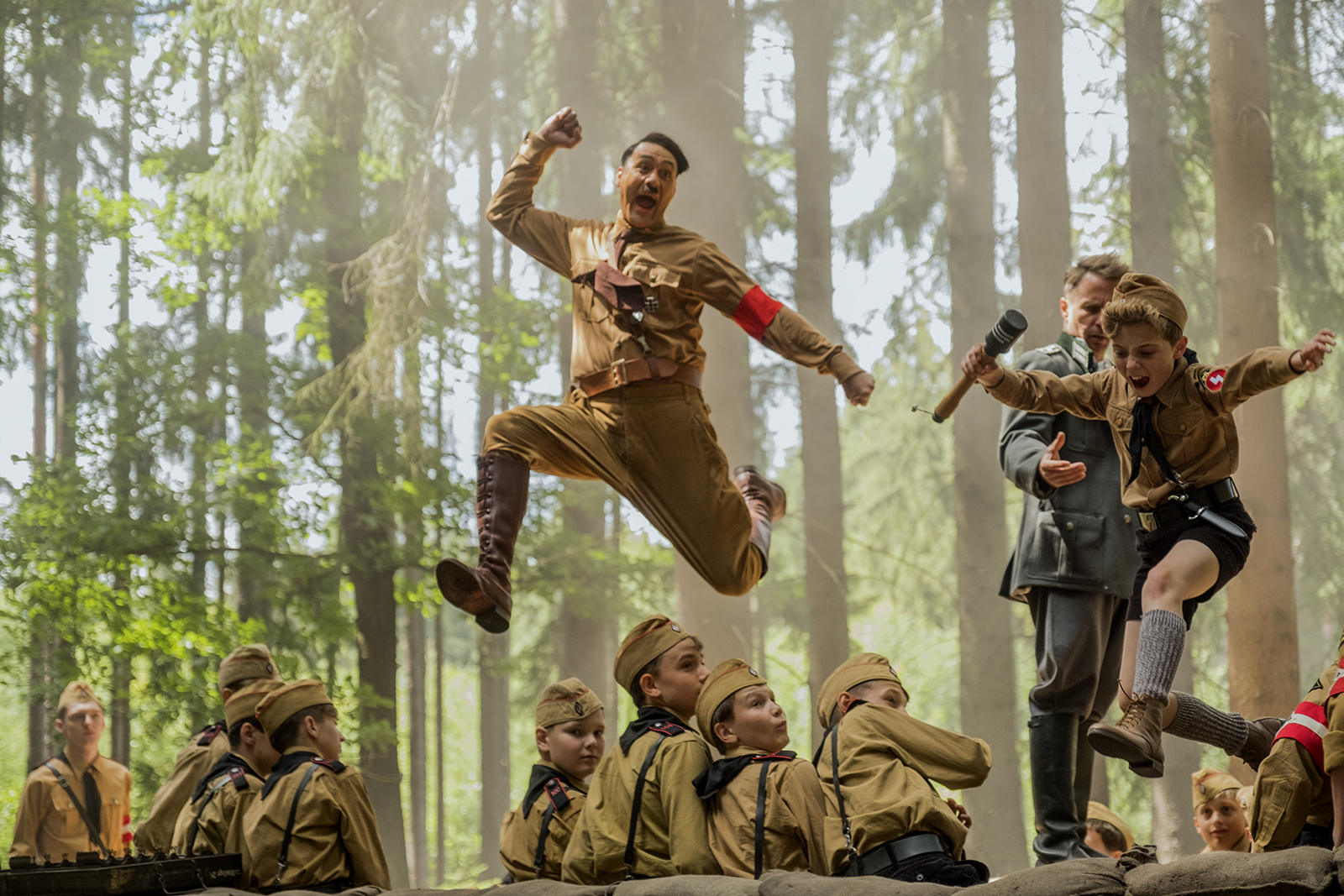Movie review: Heartfelt comedy manages to shine through in ‘Jojo Rabbit’ despite dark themes

(Courtesy of Kimberley French/Twentieth Century Fox Film Corporation)
"Jojo Rabbit"
Directed by Taika Watiti
Walt Disney Studios Motion Pictures
Oct. 18

By Sam Connon
Oct. 17, 2019 10:48 p.m.
If there was a definitive list of the world’s most taboo comedic subjects, World War II, Nazis and Adolf Hitler would probably be right at the top.
But thanks to Taika Waititi’s latest directorial effort, the year’s funniest and most charming film happens to include all three.
Amid controversy and skepticism, “Jojo Rabbit” tells the story of Jojo Betzler (Roman Griffin Davis), a 10-year-old boy living in Nazi Germany who discovers that his mother (Scarlett Johansson) is hiding a young Jewish girl in their attic. Waititi takes what most filmmakers would have turned into a three-hour dramatic epic and somehow spins it into a comedy, all while managing to keep the depth and nuance of the story intact.
[RELATED: Tired tropes, dry dialogue reduce ‘Gemini Man’ to unimpressive action-film clone]
“Jojo Rabbit” is one of the funniest movies in years, all while being set in one of the darkest times in human history. It takes the external themes seriously at times, but it balances those moments with comedy so effortlessly that it all fits in perfectly by the end.
Waititi’s own grandfather fought in World War II and his mother is Jewish, providing him a point of view that not too many other filmmakers have. The story was tailor-made for a dynamic director who can blend comedy and deeper personal themes, and Waititi is one of the only artists in Hollywood who could find the comedy in such a dark situation. As a result, Waititi was given free reign in “Jojo Rabbit” – not only as a director, but in his portrayal of Hitler as well.
That’s right, the zany New Zealander comedian plays an imaginary version of the main man of the Third Reich himself, Adolf Hitler – and he doesn’t disappoint. Waititi’s comedic chops, present in “What We Do in the Shadows” and “Thor: Ragnorok,” are evident in “Jojo Rabbit” as well, and his performance as Jojo’s imaginary friend Adolf is wacky, gut-busting and hilariously insane. The performance may be slightly off-putting for viewers who aren’t fully on board with a comedic take on Hitler, but there is enough satirical value behind the decision to make it worth more than a simple impression.
But while Waititi dominates nearly every scene he’s in, the heart of the story is Jojo himself. His internal struggle between violence, hate and self-doubt is relatable, cementing the consistently comedic film in a harsh reality. Davis plays the part to perfection, encapsulating the essence of childhood both in his adorable naivete and his frustrating stubbornness, demonstrated in his outbursts toward his single mother and desperate need for approval from his friends and father figures. Jojo’s innocence and likability – despite his horrific anti-Semitic beliefs – make the emotional moments hit that much harder.
[RELATED: ‘Joker’ successfully invites audience into its descent into madness]
To take a Nazi and make him sympathetic is a tall task to ask of any director, especially one whose background is rooted primarily in comedy. But Waititi gave the perfect setup to Jojo’s and his friends’ Nazi beliefs, helping audiences sympathize with the indoctrinated young boy rather than vilifying him. Jojo isn’t just a boy blending into his surroundings to avoid confrontation – he is fully on board with the Nazi agenda and eager to join the Germans in battle. He boasts about hating Jews and decorates his Hitler-themed room as if the chancellor was a rock star or superhero.
And that is what makes Jojo’s arc so powerful – his journey toward self-reliance isn’t only about him standing up to others and making brave motions to save his family. It is completely dependent on him changing his internal beliefs and abandoning all the comfort in his life.
The spark of Jojo’s change occurs when he meets Elsa (Thomasin McKenzie), a teenage Jew who used to be friends with his late older sister. Elsa tortures the young Jojo, playing into his over-the-top beliefs and stories about Jewish people and culture – teasing him to no end – but the friendship between the two holds the movie together. The audience knows the relationship isn’t romantic, but there is something infinitely charming about watching Jojo fall head over heels for an older girl he could never be with.
But amid the goofy and heart-warming performances by Davis, Johansson, McKenzie, Waititi and Oscar-winner Sam Rockwell is the reality that lies in any World War II movie – the war itself. While certain serious moments may feel jarring and others may come off as egregious, it all fits the bipolar identity of the story and its messages about life, love and comedy.
When “Jojo Rabbit” goes dark, it commits, and the movie is better off because of it. Instead of ignoring reality and getting comfortable as a comedy – or overlooking the blissful ignorance and innocence of childhood and making an all-out war epic – Waititi walks the line perfectly.
Family deaths, the Holocaust and slapstick humor have no business coexisting in the same film, but Waititi makes it work to a T. With neo-Nazi and white supremacist movements making a terrifying comeback in today’s society, “Jojo Rabbit” isn’t afraid to put humanity’s issues under a microscope in a twisted comedic way that only Waititi could pull off.

